Asser was a Welsh monk from St David's, Dyfed, who became Bishop of Sherborne in the 890s. About 885 he was asked by Alfred the Great to leave St David's and join the circle of learned men whom Alfred was recruiting for his court. After spending a year at Caerwent because of illness, Asser accepted.

William Camden was an English antiquarian, historian, topographer, and herald, best known as author of Britannia, the first chorographical survey of the islands of Great Britain and Ireland that relates landscape, geography, antiquarianism, and history, and the Annales, the first detailed historical account of the reign of Elizabeth I of England.
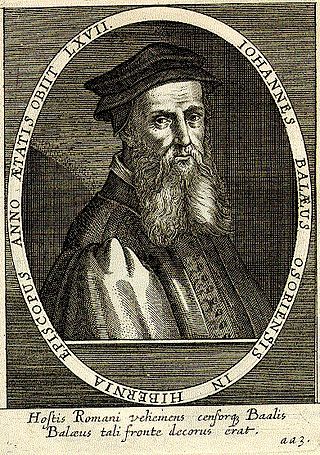
John Bale was an English churchman, historian controversialist, and Bishop of Ossory in Ireland. He wrote the oldest known historical verse drama in English, and developed and published a very extensive list of the works of British authors down to his own time, just as the monastic libraries were being dispersed. His contention that Joseph of Arimathea had brought a proto-Protestant faith to Britain that was purer than Catholicism was to have far-reaching ramifications; but his unhappy disposition and habit of quarrelling earned him the nickname "bilious Bale".
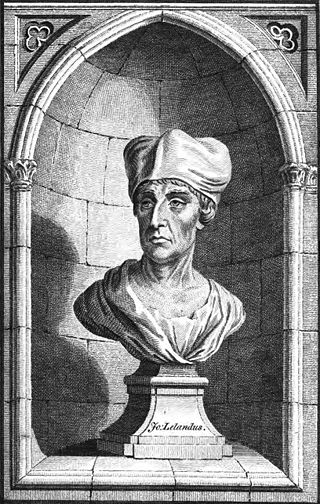
John Leland or Leyland was an English poet and antiquary.
Thomas Walsingham was an English chronicler, and is the source of much of the knowledge of the reigns of Richard II, Henry IV, Henry V and the latter reign of Edward III depicting the decline of the state of affairs of the English. He also documented the careers of John Wycliff and Wat Tyler.

The Merry Wives of Windsor or Sir John Falstaff and the Merry Wives of Windsor is a comedy by William Shakespeare first published in 1602, though believed to have been written in or before 1597. The Windsor of the play's title is a reference to the town of Windsor, also the location of Windsor Castle in Berkshire, England. Though nominally set in the reign of Henry IV or early in the reign of Henry V, the play makes no pretence to exist outside contemporary Elizabethan-era English middle-class life. It features the character Sir John Falstaff, the fat knight who had previously been featured in Henry IV, Part 1 and Part 2. It has been adapted for the opera at least ten times. The play is one of Shakespeare's lesser-regarded works among literary critics. Tradition has it that The Merry Wives of Windsor was written at the request of Queen Elizabeth I. After watching Henry IV, Part 1, she asked Shakespeare to write a play depicting Falstaff in love.

The Travels of Sir John Mandeville, commonly known as Mandeville's Travels, is a book written between 1357 and 1371 that purports to be the travel memoir of an Englishman named Sir John Mandeville across the Islamic world as far as India and China. The earliest-surviving text is in French, followed by translations into many other languages; the work acquired extraordinary popularity. Despite the extremely unreliable and often fantastical nature of the travels it describes, it was used as a work of reference: Christopher Columbus, for example, was heavily influenced by both this work and Marco Polo's earlier Travels.
Polydore Vergil or Virgil, widely known as Polydore Vergil of Urbino, was an Italian humanist scholar, historian, priest and diplomat, who spent much of his life in England. He is particularly remembered for his works the Proverbiorum libellus (1498), a collection of Latin proverbs; De inventoribus rerum (1499), a history of discoveries and origins; and the Anglica Historia, an influential history of England. He has been dubbed the "Father of English History".
The Books of Homilies are two books together containing thirty-three sermons developing the authorized reformed doctrines of the Church of England in depth and detail, as appointed for use in the 35th Article of the Thirty-Nine Articles of Religion. The longer title of the collection is Certain Sermons or Homilies Appointed to Be Read in Churches. They belong to the basic formularies of the Church of England.
Robert Fabyan was a London draper, Sheriff and Alderman, and author of Fabyan's Chronicle.
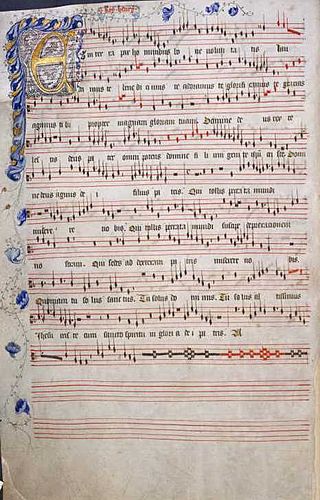
The Old Hall Manuscript is the largest, most complete, and most significant source of English sacred music of the late 14th and early 15th centuries, and as such represents the best source for late Medieval English music. The manuscript somehow survived the Reformation, and formerly belonged to St Edmund's College, a Roman Catholic school located at Old Hall Green in Hertfordshire. It was sold to the British Library after an auction at Sotheby's in 1973.
The Piers Plowman tradition is made up of about 14 different poetic and prose works from about the time of John Ball and the Peasants Revolt of 1381 through the reign of Elizabeth I and beyond. All the works feature one or more characters, typically Piers, from William Langland's poem Piers Plowman. Because the Plowman appears in the General Prologue to The Canterbury Tales by Geoffrey Chaucer but does not have his own tale, plowman tales are sometimes used as additions to The Canterbury Tales, or otherwise conflated or associated with Chaucer.
The Praier and Complaynte of the Ploweman unto Christe: written not longe after the yere of our Lorde. M. and three hundred is a short, anonymous English Christian text, probably written in the late fourteenth or early fifteenth century and first printed in about 1531. It consists of a prose tract, in the form of a polemical prayer, expressing Lollard sentiments and arguing for religious reform. In it, the simple ploughman/narrator speaks on behalf of "the repressed common man imbued with the simple truths of the Bible and a knowledge of the commandments against the mighty and monolithic conservative church". The pastoral-ecclesiastical metaphor of shepherds and sheep is used extensively as a number of criticisms are made about such things as confession, indulgences, purgatory, tithing and celibacy. The Prayer became important in the sixteenth century, when its themes were taken up by proponents of the Protestant Reformation.

The Diocese of Ossory is a Latin Church diocese of the Catholic Church in eastern Ireland. It is one of three suffragan dioceses in the ecclesiastical province of the Metropolitan Archbishop of Dublin and has been led by Niall Coll since 2023.

Condor was a legendary Cornish nobleman. The first known mentions of Condor are from heralds and antiquarians in the late sixteenth century, who recorded claims that he had been earl of Cornwall at the time of the Norman Conquest in 1066, and paid homage to William the Conqueror to keep his position. William Hals speculated that he may have supported the rebels at the Siege of Exeter (1068) and lost his earldom; much of Cornwall was given to William's Norman supporters soon afterwards. Condor's son Cadoc may have regained the title under Henry I, and later passed it through his daughter to Reginald de Dunstanville.

Early music of Britain and Ireland, from the earliest recorded times until the beginnings of the Baroque in the 17th century, was a diverse and rich culture, including sacred and secular music and ranging from the popular to the elite. Each of the major nations of England, Ireland, Scotland, and Wales retained unique forms of music and of instrumentation, but British music was highly influenced by continental developments, while British composers made an important contribution to many of the major movements in early music in Europe, including the polyphony of the Ars Nova and laid some of the foundations of later national and international classical music. Musicians from the British Isles also developed some distinctive forms of music, including Celtic chant, the Contenance Angloise, the rota, polyphonic votive antiphons, and the carol in the medieval era and English madrigals, lute ayres, and masques in the Renaissance era, which would lead to the development of English language opera at the height of the Baroque in the 18th century.
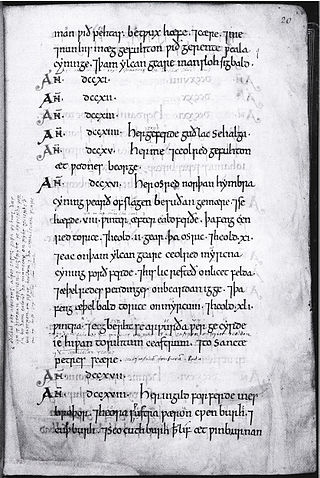
John Joscelyn, also John Jocelyn or John Joscelin, (1529–1603) was an English clergyman and antiquarian as well as secretary to Matthew Parker, an Archbishop of Canterbury during the reign of Queen Elizabeth I of England. Joscelyn was involved in Parker's attempts to secure and publish medieval manuscripts on church history, and was one of the first scholars of the Old English (Anglo-Saxon) language. He also studied the early law codes of England. His Old English dictionary, although not published during his lifetime, contributed greatly to the study of that language. Many of his manuscripts and papers eventually became part of the collections of Cambridge University, Oxford University, or the British Library.
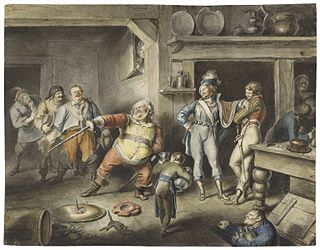
History is one of the three main genres in Western theatre alongside tragedy and comedy, although it originated, in its modern form, thousands of years later than the other primary genres. For this reason, it is often treated as a subset of tragedy. A play in this genre is known as a history play and is based on a historical narrative, often set in the medieval or early modern past. History emerged as a distinct genre from tragedy in Renaissance England. The best known examples of the genre are the history plays written by William Shakespeare, whose plays still serve to define the genre. History plays also appear elsewhere in Western literature, such as Thomas Heywood's Edward IV, Schiller's Mary Stuart or the Dutch national poet Joost van den Vondel's play Gijsbrecht van Aemstel.
Richard Argentine, alias Sexten, M.D,, was an English physician and divine.

A Short English Chronicle is a chronicle produced in England in the first half of the 15th century. It is currently held in Lambeth Palace Library, and although it begins its coverage in 1189, its content is thin until it reaches 1422. It covers the years from then until 1464 in greater depth, ending with the marriage of the Yorkist King Edward IV to Elizabeth Woodville and the capture of the deposed Lancastrian King, Henry VI. It is one of a number of chronicles and writings emitting from London in the early 15th century, and it presents national political events from a London perspective.












